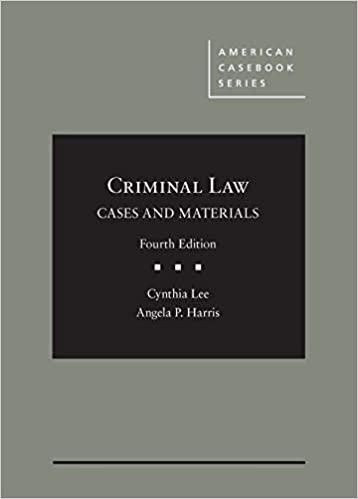Question
1. A denial of certiorari Select one: a. is a disposition on the merits b. indicates approval of the decision below c. indicates disapproval of
1. A denial of certiorari
Select one:
a.
is a disposition on the merits
b.
indicates approval of the decision below
c.
indicates disapproval of the decision below
d.
none of the above
2. A Presidential veto of a bill cannot be overridden by Congress
Select one:
a.
True
b.
False
3.A state may not consent to be sued in Federal Court under the Eleventh Amendment
Select one:
a.
True
b.
False
4.A state statute, with the sole purpose of favoring local interests over out-of-state interests, would
Select one:
a.
be protected by the Tenth Amendment
b.
not violate the Commerce Clause
c.
violate the Commerce Clause
d.
be protected by the Ninth Amendment
5.All Powers not delegated to the national government are retained by the States and the People under the
Select one:
a.
Eleventh Amendment
b.
Eighth Amendment
c.
Tenth Amendment
d.
Third Amendment
6.Arguably, the U.S. Constitution works well because
Select one:
a.
The President has the final word
b.
The Congress has the final word
c.
The Judiciary has the final word
d.
The system of checks and balances
7.Article I, Section 8 of the US Constitution gave Power to Congress to
Select one:
a.
regulate commerce
b.
declare war
c.
establish Post Offices
d.
all of the above
8.Constitutional protections apply to state actions through which of the following Amendments
Select one:
a.
First Amendment
b.
Eighth Amendment
c.
Fourteenth Amendment
d.
Third Amendment
9.Despite a state safety interest, the U. S. Supreme Court may strike down a state statute under the Dormant Commerce Clause if
Select one:
a.
the statute benefited only the state's residents
b.
it added burdens on the neighboring state
c.
all of the above
d.
none of the above
10.Despite the case being moot, the court was able to hear Roe v. Wade because
Select one:
a.
the issue was "capable of repetition yet evading review"
b.
the issue was "Ex Post Facto"
c.
the issue was "not a political question"
d.
the issue was " a First Amendment question"
11. Equal Protection is articulated in which of the following Amendments
Select one:
a.
The XIV Amendment
b.
The V amendment
c.
The I Amendment
d.
Both A and B
Clear my choice
12.Facts that could be resolved under a Commerce Clause Analysis might, in some instances, also be resolved under
Select one:
a.
Article II, Section One
b.
Article IV, Section Two
c.
Article III, Section Three
d.
The Eighth Amendment
13.Federal Congressional Power allows for legislation limiting the State's Eleventh Amendment immunity
Select one:
a.
True
b.
False
14.How many justices must agree to grant a Writ of certiorari?
Select one:
a.
nine
b.
one
c.
five
d.
four
15.If a state law "stands as an obstacle to the accomplishments and execution of the full purposes and objectives of Congress" it will
Select one:
a.
have duel authority
b.
have priority authority
c.
be preempted under Article VI's Supremacy Clause
d.
will preempt the Federal Law
16.If a state passes a law that might fail to satisfy the demands of the Dormant Commerce Clause
Select one:
a.
Congress can legislate to legitimize the state regulation
b.
Congress cannot legitimize the state's regulation
c.
Congress will hold the Law unconstitutional
d.
Congress will automatically adopt the law as their own
Step by Step Solution
There are 3 Steps involved in it
Step: 1

Get Instant Access to Expert-Tailored Solutions
See step-by-step solutions with expert insights and AI powered tools for academic success
Step: 2

Step: 3

Ace Your Homework with AI
Get the answers you need in no time with our AI-driven, step-by-step assistance
Get Started


